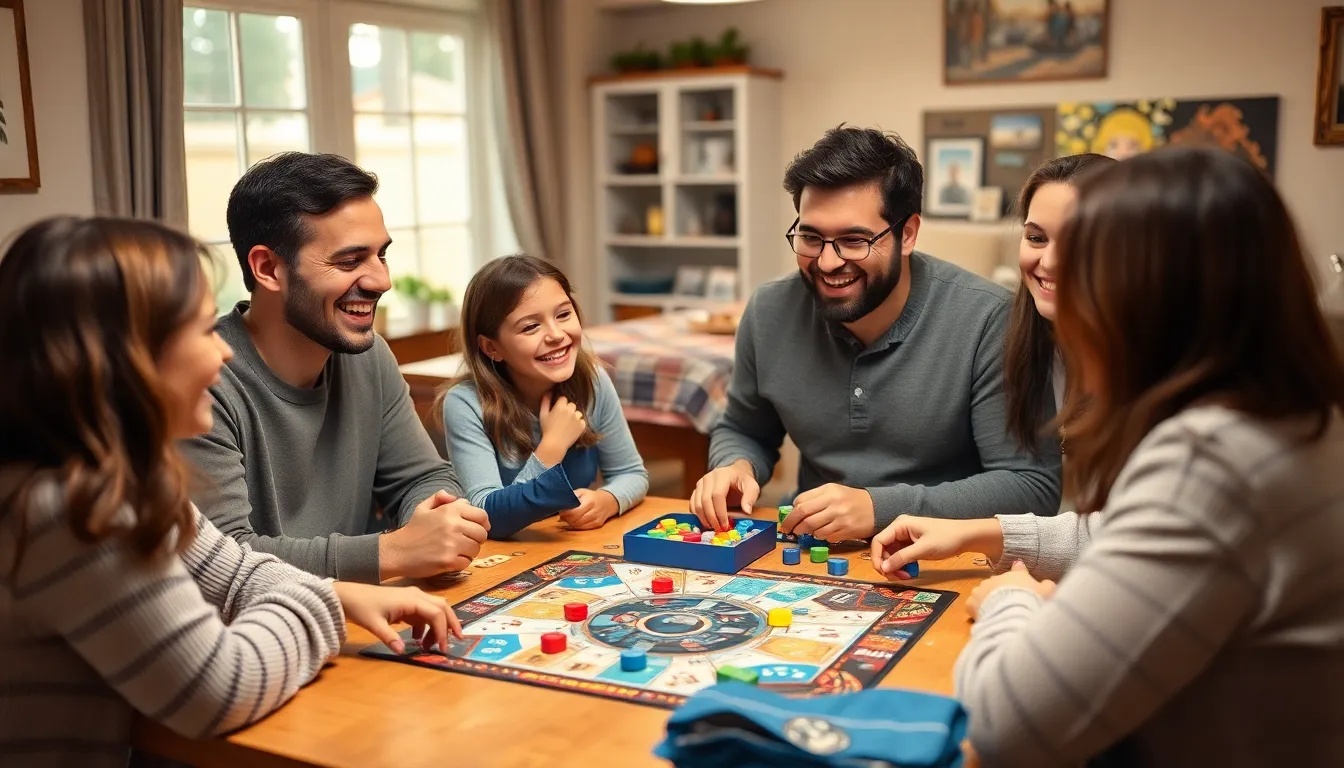Family games have a unique way of bringing everyone together, creating laughter and memories that last a lifetime. In today’s fast-paced world, finding time to bond with loved ones can be challenging. That’s where these games come in, offering a perfect blend of fun and connection for all ages.
From classic board games to lively outdoor activities, the options are endless. These games not only entertain but also foster teamwork and communication skills. Whether it’s a rainy day indoors or a sunny afternoon in the backyard, family games provide an opportunity to unplug and engage, making every moment count.
Table of Contents
ToggleWhat Are Family Games?
Family games refer to interactive activities that foster relationships among family members through play. These games encompass a wide range of formats, including board games, card games, outdoor activities, and video games. Each type encourages collaboration, fun, and communication.
Board games, such as Monopoly or Scrabble, stimulate strategic thinking and creativity. They offer structured gameplay, which can engage participants for hours. Card games, like Uno or Poker, provide quick and dynamic experiences that can adapt to various skill levels.
Outdoor activities, including Frisbee or tag, promote physical activity and teamwork. These games facilitate bonding in natural settings, enhancing the enjoyment factor. Video games, with multi-player options, allow family members to enter immersive worlds together, nurturing teamwork and problem-solving skills.
Family games enrich interpersonal connections through shared experiences. They create opportunities for laughter, learning, and cooperation, essential elements in building strong familial bonds.
Benefits of Playing Family Games

Family games offer numerous benefits, including enhanced relationships and improved communication skills. Engaging in these activities fosters a nurturing environment for family members.
Strengthening Family Bonds
Strengthening family bonds occurs through shared experiences during games. Families explore teamwork while strategizing or competing, leading to increased trust and cooperation. Game interactions encourage laughter and lightheartedness, making difficult conversations more manageable. Regular family game nights create traditions, reinforcing a sense of belonging and unity. Activities like board games, card games, and outdoor challenges cultivate lasting memories that families cherish.
Enhancing Communication Skills
Enhancing communication skills is another key benefit of family games. Players learn to express thoughts clearly, negotiate plans, and listen actively. These interactions develop critical thinking, as individuals must articulate strategies and respond to opponents. Games that require teamwork, such as charades or cooperative board games, promote effective dialogue, allowing family members to practice empathy and understanding. Strengthening communication through play fosters respect and harmony, essential elements for healthy family dynamics.
Types of Family Games
Family games come in various forms, each offering unique opportunities for interaction and engagement. The following sections outline popular types of family games, emphasizing their distinctive features and benefits.
Board Games
Board games serve as a classic option for family game nights. They typically involve strategic thinking, teamwork, and problem-solving. Popular selections like Monopoly, Scrabble, and Ticket to Ride require players to plan while interacting with family members. These games foster conversation and collaboration, allowing family members to learn from each other’s strategies and styles. Board games not only entertain but also enhance cognitive skills and reinforce knowledge through playful competition.
Card Games
Card games provide quick, adaptable fun for families, accommodating various age groups and preferences. Games like Uno, Poker, and Go Fish are easy to learn and can be played in short bursts, making them ideal for busy family schedules. Card games often promote critical thinking and social interaction, as players must strategize and adapt their approaches based on others’ actions. The flexibility of card games encourages participation from all family members while building camaraderie through friendly competition.
Outdoor Games
Outdoor games bring families together in an active setting, promoting physical fitness and teamwork. Games like capture the flag, sack races, and frisbee encourage movement and collaboration, enhancing both physical health and social bonds. Engaging in outdoor activities helps families enjoy nature while reinforcing communication and cooperation skills. Outdoor games create lasting memories as families participate in fun challenges and celebrate achievements together, strengthening their connection in a lively environment.
Tips for Choosing the Right Family Game
Selecting the ideal family game involves several key considerations. Follow these practical tips to ensure a fun and engaging experience for everyone.
- Consider Age Appropriateness
Assess the ages of participants. Choose games that match the age range to promote understanding and enjoyment. Games designed for younger players engage them through simple rules and vivid imagery, while older players may appreciate strategic challenges.
- Evaluate Player Preferences
Take player interests into account. Some families enjoy competitive games, while others prefer cooperative activities. Identify common interests to increase engagement and satisfaction during gameplay.
- Check Game Duration
Review the estimated playtime. Select games that fit your available time to keep excitement high. Shorter games work well for quick play sessions, while longer ones can fill an entire evening.
- Analyze Complexity
Examine rule complexity. Simple, straightforward games reduce frustration and encourage participation. Select games that everyone can grasp quickly to maximize enjoyment.
- Test Game Variety
Explore different game types. Seek a mix of board games, card games, and outdoor activities to maintain variety and cater to different moods. Varied experiences prevent fatigue from repetitive gameplay.
- Look for Replay Value
Prioritize games with high replay value. Games that change with each playthrough or offer multiple strategies keep interest alive. This provides a compelling reason for families to return to the game.
- Read Reviews and Recommendations
Research reviews for insights into popular family games. Online reviews help gauge other players’ experiences. Recommendations from friends or family can also direct you toward engaging options.
- Plan for Group Size
Factor in the number of players. Some games accommodate large groups, while others work best with fewer players. Ensure the selected game fits your family’s size to create a seamless experience.
By following these tips, families can select games that foster enjoyment, communication, and connection among family members during their game nights.
Family games serve as a vital tool for strengthening relationships and creating cherished memories. By engaging in various activities together, families can enhance communication and foster teamwork in a fun and relaxed environment. Whether it’s a classic board game or an exciting outdoor challenge, these experiences offer opportunities to bond and grow closer.
Establishing regular game nights not only cultivates traditions but also reinforces a sense of belonging. As families navigate the challenges of modern life, prioritizing playtime can significantly impact their dynamics. Embracing the joy of family games is an investment in connection, laughter, and understanding that lasts a lifetime.








